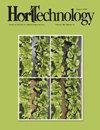Selected Beneficial Microbes Alleviate Salinity Stress in Hydroponic Lettuce and Pak Choi
IF 1
4区 农林科学
Q3 HORTICULTURE
引用次数: 0
Abstract
Hydroponics is widely used in greenhouse and vertical farming production because these facilities can precisely control environmental conditions such as lighting, temperature, and vapor pressure deficit. However, the fertilizer solutions have a short life span, and they often do not have adequate microbial populations to enhance plant growth. Previous studies have shown the potential of beneficial microbes to promote plant production and alleviate abiotic and biotic stressors in the field, and studies on their use in controlled environments such as greenhouses and vertical farms are limited in the literature. In this study, we selected several plant growth promoting microbes (PGPMs) and tested their effects on alleviating salinity stress in ‘Rex’ lettuce (Lactuca sativa) and ‘Red Pac’ pak choi (Brassica chinensis) grown in deep water culture hydroponics. Our goal was to use one stressor, salinity, that induces profound symptoms in plant morphology. A three-cycle study was conducted using five PGPMs [Bacillus, Glomus, Lactobacillus, Trichoderma, and Bacillus/Pseudomonas/Trichoderma (B/P/T) mix] and two salinity levels [no salinity and salinity treatment, with 120 mM, 40 mM, and 80 mM sodium chloride (NaCl) solution used for the first, second, and third cycles, respectively]. We measured the effects of PGPMs and salinity on plant growth and quality and the solution pH and electrical conductivity (EC). Salinity stress decreased lettuce and pak choi leaf area and shoot fresh weight and increased plant leaf chlorophyll and anthocyanin contents with increased solution EC. Under high-salinity stress (120 mM NaCl), the addition of Trichoderma reduced pak choi leaf area and fresh weight but increased solution pH, whereas under low salinity stress (40 mM NaCl), Trichoderma increased pak choi leaf chlorophyll content. Under moderate-salinity stress (80 mM NaCl) condition, the addition of Glomus sp. increased lettuce fresh weight and leaf area, and B/P/T mix increased pak choi leaf area. In conclusion, using the selected PGPMs in low to moderate-salinity stress could increase lettuce and pak choi growth and quality parameters. These results have some practical applications in the future when more saline water is used for production.精选有益微生物缓解水培生菜和白菜的盐度胁迫
水培法被广泛应用于温室和垂直农业生产,因为这些设施可以精确控制光照、温度和蒸汽压不足等环境条件。然而,肥料溶液的寿命很短,而且往往没有足够的微生物种群来促进植物生长。以往的研究表明,有益微生物具有促进植物生产、缓解田间非生物和生物胁迫的潜力,而关于在温室和垂直农场等受控环境中使用有益微生物的研究在文献中还很有限。在本研究中,我们选择了几种植物生长促进微生物(PGPMs),并测试了它们对缓解在深水培养水培法中生长的'Rex'生菜(Lactuca sativa)和'Red Pac'白菜(Brassica chinensis)的盐度胁迫的影响。我们的目标是使用一种能在植物形态上诱发深刻症状的胁迫因素--盐度。我们使用五种 PGPM(芽孢杆菌、革兰氏菌、乳酸杆菌、毛霉菌和芽孢杆菌/假单胞菌/毛霉菌(B/P/T)混合物)和两种盐度水平(无盐度和盐度处理,第一、第二和第三周期分别使用 120 毫摩尔、40 毫摩尔和 80 毫摩尔氯化钠(NaCl)溶液)进行了三周期研究。我们测量了 PGPMs 和盐度对植物生长和质量以及溶液 pH 值和导电率(EC)的影响。盐度胁迫降低了莴苣和白菜的叶面积和嫩枝鲜重,增加了植物叶片的叶绿素和花青素含量,同时增加了溶液的导电率。在高盐度胁迫(120 毫摩尔 NaCl)下,加入毛霉菌会减少白菜叶面积和鲜重,但会增加溶液 pH 值;而在低盐度胁迫(40 毫摩尔 NaCl)下,毛霉菌会增加白菜叶叶绿素含量。在中度盐度胁迫(80 毫摩尔 NaCl)条件下,加入 Glomus sp. 增加了莴苣鲜重和叶面积,B/P/T 混合菌增加了白菜叶面积。总之,在中低盐度胁迫条件下使用所选的 PGPMs 可提高莴苣和白菜的生长和品质参数。这些结果在未来使用更多盐水进行生产时具有一定的实际应用价值。
本文章由计算机程序翻译,如有差异,请以英文原文为准。
求助全文
约1分钟内获得全文
求助全文
来源期刊

Horttechnology
农林科学-园艺
CiteScore
2.30
自引率
10.00%
发文量
67
审稿时长
3 months
期刊介绍:
HortTechnology serves as the primary outreach publication of the American Society for Horticultural Science. Its mission is to provide science-based information to professional horticulturists, practitioners, and educators; promote and encourage an interchange of ideas among scientists, educators, and professionals working in horticulture; and provide an opportunity for peer review of practical horticultural information.
 求助内容:
求助内容: 应助结果提醒方式:
应助结果提醒方式:


